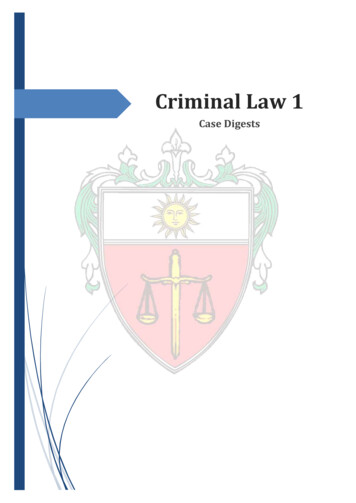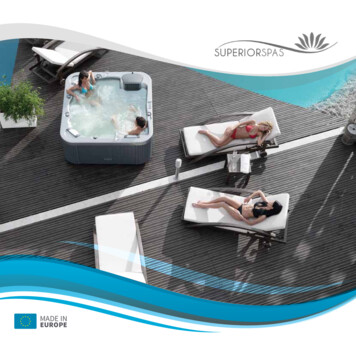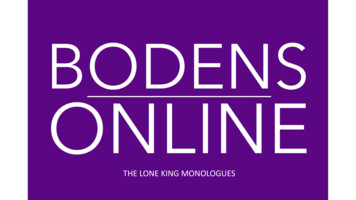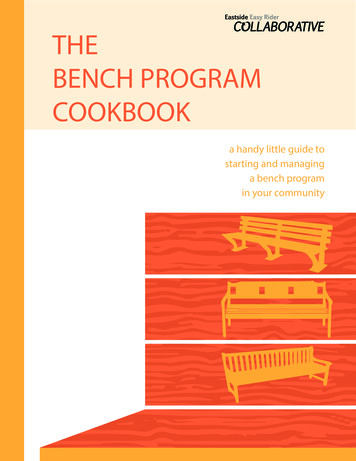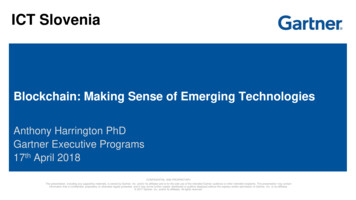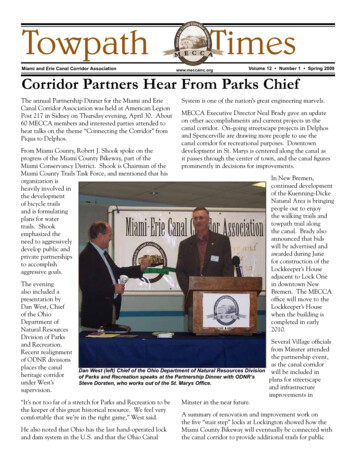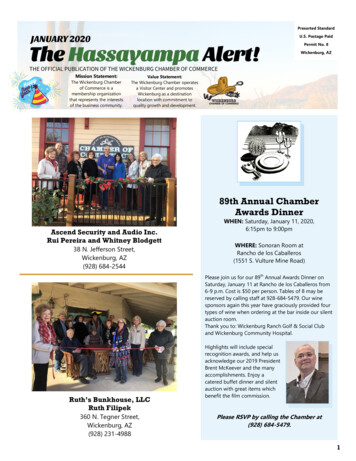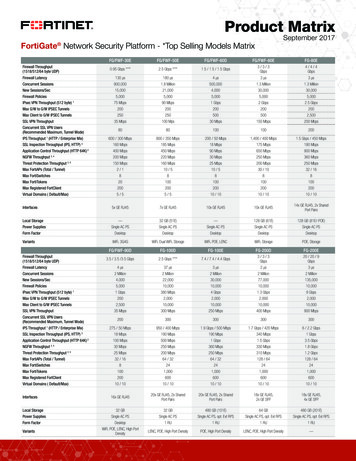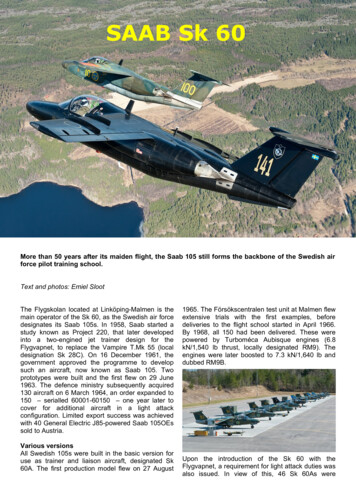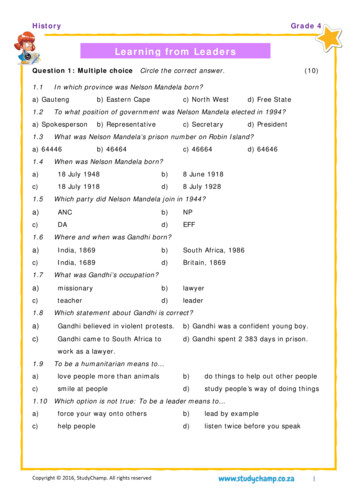
Transcription
HistoryGrade 4Learning from LeadersQuestion 1: Multiple choice1.1c) North Westb) Representativec) Secretaryb) 46464c) 4666418 July 1948b)8 June 1918c)18 July 1918d)8 July 1928ANCb)NPc)DAd)EFFWhere and when was Gandhi born?a)India, 1869b)South Africa, 1986c)India, 1689d)Britain, 18691.7What was Gandhi’s 8d) 64646Which party did Nelson Mandela join in 1944?a)1.6d) PresidentWhen was Nelson Mandela born?a)1.5d) Free StateWhat was Nelson Mandela’s prison number on Robin Island?a) 644461.4b) Eastern CapeTo what position of government was Nelson Mandela elected in 1994?a) Spokesperson1.3(10)In which province was Nelson Mandela born?a) Gauteng1.2Circle the correct answer.Which statement about Gandhi is correct?a)Gandhi believed in violent protests.b) Gandhi was a confident young boy.c)Gandhi came to South Africa tod) Gandhi spent 2 383 days in prison.work as a lawyer.1.9To be a humanitarian means to a)love people more than animalsb)do things to help out other peoplec)smile at peopled)study people’s way of doing things1.10Which option is not true: To be a leader means to a)force your way onto othersb)lead by examplec)help peopled)listen twice before you speak1
HistoryQuestion 2:2.1Grade 4All the statements below are FALSE. Underline the word/s that makeeach statement FALSE, then rewrite each sentence to make it true.(9)Leaders are always perfect.2.2Leaders never make mistakes.2.3A leader forces team members to play a role in a process.2.4A leader acts as the only authority in the team.2.5Leaders are born; they cannot be made.2.6There are few leaders around us.2.7The more money you have, the better leadership skills you have.2.8A good leader makes people feel left-out.2.9A bad leader can admit his/her mistakes.Question 3:Fill in the missing words to make the sentences correct.3.1Nelson Mandela studied to be a .3.2Nelson Mandela was kept in prison for years in theMaximum Prison Facility on .3.3(1)(2)A book with the title, waspublished about Mandela’s life.(1)3.4In 1993 Nelson Mandela was awarded the . (1)3.5Complete the sentence: I think Nelson Mandela was a good leader, because:(3)2
History3.6Grade 4Gandhi’s was given the title of which means.(2)3.7Gandhi came to South Africa to work as a .(1)3.8He led the people of South Africa to peacefully protest against(1)3.9His idea of peaceful protests was used in the fight against .(1)Question 4:Define the following in detail:4.1Apartheid:4.2Human rights:(2)4.3(2)Willingness to serve:4.4(2)Selflessness:4.5(2)Legacy:Question 5: Thinking MapsComparison using a double-bubble map:Complete the double-bubble map by arranging each of the following in the correct1 eachplace. Write only the applicable letter in each bubble:2He had to overcome his shyness to bea good leader.ABC(2)He believed in equal rights for all.Later in his life, he supported thearmed struggle.DHe was a lawyer.EHe believed inpeaceful protests.He was a confident leaderwho was good atGmotivating people.HF(4)He was imprisoned as aresult of his beliefs.He led by example.3
HistoryGrade 4In a double-bubblemap, similarities aregiven in the middle anddifferences at each end.MandelaQuestion 6:6.1GandhiAnswer the following questions:Name and discuss four qualities of a good leader.(4)6.2Briefly discuss what you have learned from Nelson Mandela’s legacy?(2)6.3“It is not true that a leader needs to have a lot of money to make a difference.”Use Gandhi as an example to prove that the above statement is true.(2)6.4Explain what the term “satyagraha” means.(3)6.5What happened on 27 April 1994?(2)4
History6.6Grade 4Name two organisations that have been established to continue Nelson Mandela’slegacy of caring for and helping people.(2)6.7What is the Nobel Peace Prize?(2)Question 7:A: Salt MarchRefer to the images, then answer the questions that follow:B: Nelson Mandela DayC: Prison cell7.1Image A shows eating salt from the coast.(1)7.2Explain what the Salt March was.(3)7.3Why did he eat salt from the coast?(2)7.4International Nelson Mandela Day is celebrated on (1)7.5People are encouraged to do charity work for minutes on7.6this day.(1)What is the reason for the minutes specified?(2)5
History7.77.8Grade 4Image C shows Nelson Mandela in cell number on.(2)Briefly explain how life was in prison for the political prisoners.(3)7.9When was Nelson Mandela released from prison? (1)6
HistoryGrade 4MEMO:Question 1: Multiple choiceCircle the correct answer.1.1 b)1.2 d)1.3 c)1.4 c)1.5 a)1.6 a)1.7 b)1.8 c)1.9 b)1.10 a)(10)Question 2:2.1All the statements below are FALSE. Underline the word/s that makeeach statement FALSE, then rewrite each sentence to make it true.(9)Leaders are always perfect.Leaders are not always perfect.2.2Leaders never make mistakes. Leaders sometimes make mistakes.2.3A leader forces team members to play a role in a process.A leader asks/encourages team members to play a role in a process.2.4A leader acts as the only authority in the team.A leader acts as an authority in the team, but not the only authority.2.5Leaders are born; they cannot be made.Some people develop into leaders later in their lives.2.6There are few leaders around us.There are many leaders around us (familyleaders, school leaders, business leaders, country leaders).2.7The more money you have, the better leadership skills you have.Money has no influence on your leadership skills.2.8A good leader makes people feel left-out.A good leader makes people feel that they belong.2.9A bad leader can admit his/her mistakes.A good leader can admit his/her mistakes.Question 3:Fill in the missing words to make the sentences correct.3.1Nelson Mandela studied to be a lawyer.3.2Nelson Mandela was kept in prison for 27 years in the Maximum Prison Facility onRobben Island.3.3(1)(2)A book with the title, The Long Walk to Freedom was published about Mandela’slife.(1)3.4In 1993 Nelson Mandela was awarded the Nobel Peace Prize.(1)3.5Complete the sentence: I think Nelson Mandela was a good leader, because:He fought for human rights, he didn’t mind to go to prison for his people and his beliefs,he spoke out about wrongdoings without being scared, he led by example and alwaysfirst tried to peacefully resolve conflict, he was a humanitarian that always put othersbefore himself.(3)7
HistoryGrade 43.7Gandhi’s was given the title of Mahatma which means Great Soul.(2)3.8Gandhi came to South Africa to work as a lawyer.(1)3.9He led the people of South Africa to peacefully protest against the fact that Indianand Black South Africans were not allowed to vote and did not have equal rights.3.10His idea of peaceful protests was used in the fight against Apartheid.Question 4:(1)Define the following in detail:4.1Apartheid:A former social and political system in South Africa in which black people and peoplefrom other racial groups did not have the same political and economic rights as whitepeople and were forced to live separately from white people.4.2Human rights:The basic rights and freedoms to which all humans are considered to be entitled,including the rights to life, freedom, equality, and a fair trial, freedom from slavery andtorture, and freedom of thought and expression, freedom to vote, etc.4.3Willingness to serve:An act where you place the will to serve others above the need to look after yourself. Itis an act of giving of yourself to people around you.4.4Selflessness:It is an act of having or showing great concern for other people. Putting other people’sneeds above your own.4.5Legacy:Legacy is learning from the past by what people pass on from generation to generation.A person will leave a legacy behind of his or her experiences, knowledge, lessons learnt,traditions, achievements, failures. It is what you remember of a person’s life.Question 5: Thinking MapsComparison using a double-bubble map:Complete the double-bubble map by arranging each of the following in the correct1 eachplace. Write only the applicable letter in each bubble:2(4)8
HistoryQuestion 6:6.1Grade 4Answer the following questions:Name and discuss 4 qualities of a good leader.Good leaders: listen to people and their team members work for the good of others and are servants of the people. are brave and courageous are dedicated are committed to what they believe in work co-operatively with people are selfless6.2Briefly discuss what you have learned from Nelson Mandela’s legacy? (Discussbullet points in sentence format) Examples given: Never give up Allow your failures to teach you valuable life lessons Respect the opinion of others, you are entitled to your opinion as well. Stand together as a nation Have knowledge, it gives you power. Put other’s needs above your own.6.3“It is not true that a leader needs to have a lot of money to make a difference.”Use Gandhi as an example to proof the above statement.(3)Gandhi is an example of a simple man with very few possessions and very little moneywho made an enormous difference to people’s lives. Gandhi believed in the truth andthe ability to make a difference in people’s lives. He taught people that you did nothave to accept the wrong things in life and that you can change the world with peacefulprotest, for which no money is needed.6.4Explain what the term “satyagraha” means.(3)Satyagraha is an idea or a way of life that means fighting for the truth without violence,but with firmness. Everywhere Gandhi went, he preached the idea of Satyagraha,encouraging people to peacefully protest, e.g. with marches, to show governments thatthey wanted change and that all people should be equal.6.5What happened on 27 April 1994?27 April 1994 was the day on which the first democratic elections in South Africa tookplace. Nelson Mandela was elected president of the Republic of South Africa. This dayhas been celebrated as Freedom Day ever since.9
History6.6Grade 4Name two organisations that have been established to continue Nelson Mandela’slegacy of caring for and helping people.(2)The Nelson Mandela Children’s Fund that focuses on upliftment of the country’s youthand teaching children to take part in their own upliftment and that of their communities.The Mandela Rhodes Foundation that focuses on providing leadership and educationopportunities for young people with leadership potential in Africa.6.7What is the Nobel Peace Prize?(2)The Nobel Peace Prize is a special and prestigious prize awarded to a person or personswho promote peace and actively try to stop war and violence in the world. The Nobelprizes were invented by Alfred Nobel, a Swedish business man.Question 7:Refer to the images, then answer the questions that follow:7.1Image A shows Mahatma Gandhi eating salt from the coast.(1)7.2Explain what the Salt March was.(3)When India was under British control, the Salt Tax was enforced by the BritishGovernment. This forced everyone to buy salt only from the British and people werebanned from buying or selling or collecting their own salt. Gandhi led a peaceful protestagainst the Salt Tax, walking from village to village all the way to the coast.7.3Why did he eat salt from the coast?(2)When the protesters reached the coast, Gandhi ate a lump of salt from the coast,breaking the law. All of the people who ate salt were arrested and imprisoned. Gandhidid this to show his people that he was not afraid to stand up and fight for what is right,even if it meant that he had to go to prison.7.4International Nelson Mandela Day is celebrated on 18 July every year (Mandela’sbirthday).(1)7.5People are encouraged to do charity work for 67 minutes on this day.(1)7.6What is the reason for the minutes specified?(2)The sixty-seven minutes refer to the sixty-seven years of Mandela’s life that hededicated to fight for social justice.7.7Image C shows Nelson Mandela in cell number 46664 on Robben Island .(2)7.8Briefly explain how life was in prison for the political prisoners.(3)Prisoners had to do hard labour, working on the quarry, digging limestone. They wereallowed only one visitor and one letter every six months. They lived in a small cell withonly a rug and a few blankets to sleep on.7.9When was Nelson Mandela released from prison? 1990(1)10
3.3 A book with the title, _ was published about Mandela ’ s life. (1) . He had to overcome his shyness to be a good leader. D He believed in equal rights for all. Later in his life, he supported the armed struggle. He was a lawyer. He believed in peaceful protests. He led by example. He was a confident leader who was good at motivating people. He was imprisoned as a result of his .
